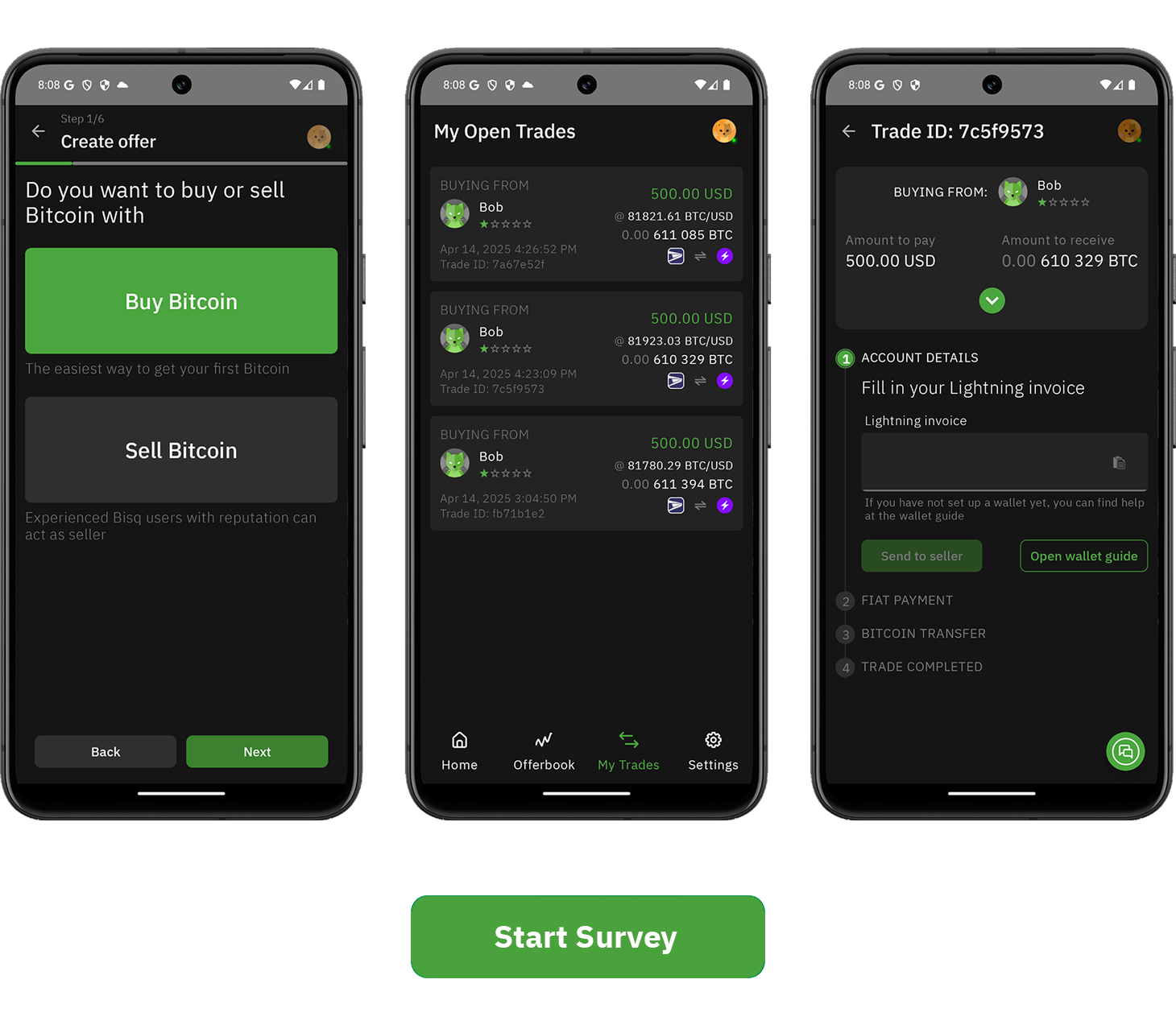We are developing Bisq Easy mobile applications and would like to better understand your needs. Your feedback will help us optimize resource allocation and deployment strategy.
Before we ask a few questions, please review the two available modes of operation:
Bisq Easy Mobile - Full Node Mode
- Description: A self-contained mobile version of the Bisq 2 desktop client, running a full Bisq Easy node with a limited feature set.
- Platform: Android only (leverages the existing Java codebase).
- Functionality:
- Connects directly to the Bisq P2P network over Tor.
- Enables decentralized trading with full autonomy.
- Requirements:
- Higher device resources (CPU, memory, storage).
- Considerations:
- Increased battery and resource consumption.
- No synchronization with desktop app (user profile and data) initially — may be added later.
Bisq Easy Connect - Light Client Mode
- Description: A lightweight mobile app that connects to a remote Bisq 2 node and acts as a remote control for Bisq Easy running on that node.
- Platform: Android and iOS.
- Functionality:
- Provides user interface only; no P2P or Tor networking on the mobile device itself.
- Connects securely to a full node via Tor or clearnet.
- Offers the same limited feature set as Full Node Mode.
- Remote Node Requirements:
- Node must be always online and reachable.
- Node can be the user’s own full node or a trusted operator (e.g., friend and family — “Uncle Jim” model¹).
- If clearnet (non-Tor) is used, node operator must set up port forwarding.
- Use Cases:
- Lower-resource mobile devices.
- Mobile access to a self-hosted Bisq node.
- Onboarding via trusted “Uncle Jim” operators.
- Considerations:
- Requires trust in the remote node operator when using the “Uncle Jim” model.
- Recommended only in trusted environment (self-hosted node or friends and family).
- Each remote node can only support one mobile app connection; multi-user support is not available.
Quick Overview

This two-mode strategy allows us to serve both advanced users and casual users, maintaining a strong balance between privacy, decentralization, and usability across platforms.
You Might Also Wonder…
Why isn’t Bisq 1’s MultiSig protocol supported on mobile?
Bisq 1’s MultiSig protocol requires high resource availability and continuous online presence for makers, making it unsuitable for mobile environments. Bisq 2 introduces MuSig, a more efficient and privacy-enhancing protocol. However, even with MuSig, running a full Bisq node on mobile devices remains unrealistic — only the Light Client mode will be viable for mobile users.
Why is Full Node mode Android-only?
Bisq’s core codebase is written in Java, which runs natively on Android but not on iOS. Rewriting the full node in Swift for iOS would require significant development effort. Moreover, Apple’s restrictive App Store policies and the technical challenges of reliably using Tor on iOS further increase the complexity and risk. As a result, Full Node support is limited to Android, where these obstacles do not exist.
The survey does not require registration and can be accessed with Tor browser
¹ The “Uncle Jim” model refers to a setup where a trusted individual (e.g., a friend or family member) operates a full Bisq node, allowing others to securely connect via the Bisq Easy Connect app. This enables lightweight, decentralized participation without requiring each user to manage their own node infrastructure.

